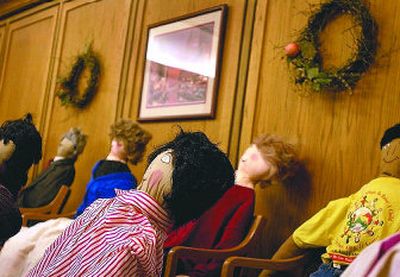One more ordeal

The chief witness in the case of Spokane County v. Perry J. Bache fidgeted in her jean jacket.
“Do you remember he showed you a bunch of pictures of people?” prosecutor Ed Hay asked.
“Mmm-hmm,” the 8-year-old girl replied.
“What do you remember about that?”
“He, uh … oh, I forgot.”
Later, Hay pressed on: Hadn’t the 50-year-old registered sex offender – charged with exposing himself – shown the little girl a pornographic magazine? The girl said she was embarrassed.
“Those people over there need to hear the truth,” Hay said, gesturing toward the jury. “Can you say the truth about what you saw?’
For a child, truth can be a slippery concept. But in criminal trials of child sexual abuse, the case may be built around the testimony of a child too young to read, or understand the legal proceedings.
“Imagine being in court, being a kid, and having to face your accuser,” said Karen Winston, a forensic interviewer for Partners with Families and Children: Spokane, which specializes in treating abused and neglected children. “There is always this fear: Is this going to happen again? Is this person going to come and find me?”
Child witnesses play a key role in putting away sex offenders, but not without angst, trauma and often nervous, mumbling testimony. Their suggestibility – highlighted by the now-discredited Wenatchee sex ring investigations in the 1990s – has proved to be a thorny legal issue for prosecutors.
“The child is frequently almost the whole ballgame,” said Becky Roe, former head of the special assault division at the King County Prosecutor’s Office. “Their time-telling abilities aren’t great. They can be tripped up on peripheral questions. They can give inconsistent answers, and, sometimes, they can tell people what they think they want to hear.”
Easing fears by learning system
The witness wore tube socks. He crimped the microphone at the witness stand, bent it to his mouth and breathed heavily.
“Is there a courtroom so big that the judge needs an elevator to get to the chair?” the tow-headed 14-year-old boy asked, somewhat wistfully. “Like in New York or something? With snipers on the sides?”
It was a Saturday and an unusual courtroom atmosphere as three young teenagers learned about the legal system. The training, known as Spokane County Kids’ Court, is designed to help child victims, witnesses and their families understand the legal process.
A dozen dolls sat in the jury box. The teens pretended to be the judge, banging the gavel. They cross-examined imaginary witnesses and objected to specious statements.
Enticed by movie clips from “Legally Blonde” and “My Cousin Vinnie,” they quickly opened up about their upcoming testimony.
“If I didn’t want to see the person, and I didn’t want him in the room, could I, like, request that?”
In Washington, children can testify by closed circuit under rare circumstances, but defendants have a right to hear the charges against them.
“What happens if they, like, glare at you?”
“You’re not going to be intimidated in the court,” said District Court Judge Annette Plese, who volunteered at the training. “The judge will stop them.”
Adding to the anxiety of the courtroom, children are often called to testify against a family member or neighbor. In the 1990s, Canada’s Child Witness Project, which helps children prepare for court, found that four out of 10 children in sexual abuse cases testified against a family member. The project found that a parent often did not believe the child, and in one-fourth of the cases, the child was pressured not to testify.
“It’s immoral not to prepare kids for court,” said Paul Stearns, a Snohomish County prosecutor who has written about child witnesses. “Obviously, going to court for anybody … (is) going to be a stressful event. You need to make sure that kids know what’s going on, and their caretakers know what’s going on.”
Kelly Fitzgerald, a Spokane County deputy prosecutor who volunteers at Kids’ Court, engages the teens in a discussion of movies, then transitions to the details of court.
“What do you say in court if they ask you a question and you don’t know?” Fitzgerald asked.
“I don’t know,” the teens responded.
“Exactly,” she replied.
Unease and embarrassment
Perry Bache, a registered sex offender, shook his head as the young girl testified.
Court records say Bache trailed the girl in his car as she rode her scooter home last spring. He showed the girl a pornographic magazine and pulled down his pants, exposing his buttocks, according to the records. Then he reportedly asked the girl to do the same.
“Are you embarrassed to talk about it?” Hay asked the witness.
“Well,” she said, “I am.”
Bache has a long history with law enforcement. In 1984, he was found guilty of public indecency, a misdemeanor, court records show. Twenty years later, he pleaded guilty to communication with a minor for immoral purposes.
In March, based almost solely on the girl’s testimony, Bache was found guilty of communicating with a minor for immoral purposes and indecent exposure, both Class C felonies. Bache faces a sentence from 3 to 12 months.
“The short answer is, she had to be there (in court),” Hay said after the trial. “Without her, there wouldn’t have been a conviction.”